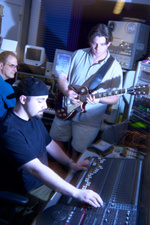Collaboration: when it's working, it doesn't hurt
 As a result of the "Lyric Writing: Tools and Strategies" I took this Spring through Berklee Online, I've been thinking a lot about collaboration. The class format and the students in that class combined to create a highly interactive environment. We were spread all over the world, spanning an entire day's worth of time zones and yet everybody interacted and learned from those interactions. Strangely, though, when the topic of collaborative songwriting came up, many of the students were uncomfortable. Their concerns are similar to those I've seen across most of my life experiences, in music, in software, in school.
As a result of the "Lyric Writing: Tools and Strategies" I took this Spring through Berklee Online, I've been thinking a lot about collaboration. The class format and the students in that class combined to create a highly interactive environment. We were spread all over the world, spanning an entire day's worth of time zones and yet everybody interacted and learned from those interactions. Strangely, though, when the topic of collaborative songwriting came up, many of the students were uncomfortable. Their concerns are similar to those I've seen across most of my life experiences, in music, in software, in school.
Collaboration scares people. It's seen as giving up ones own goals, degrading ones own vision. It's seen as the path to impurity and struggle. Sadly, there are so many examples in the real world to support this. Just listen to anything from The Troggs Tapes (careful there's lots of swearing) to the U.S. legislature and it's clear that working together is hard. Watch any reality TV show or This Is Spinal Tap and you will get a a vivid reminder that collections of people have a hard time agreeing on anything, especially when a shared creative goal is involved.
Despite that, however, there is nothing better than a successful collaboration. When it's working, it really doesn't hurt at all. The ideas flow more quickly and you look back at the end result with awe. The song or other creative work is something that no one person could have generated. Sure, sometimes you end up with the offspring of 100 maniacs but the beauty of creative endeavors is that you can always set one aside and move on to the next. In fact, many of us believe that's how creativity works anyway. Not every creative work is successful, but the practice you get on the unsuccessful ones combines with the raw output of repeatedly trying to assure that you do generate successful works.
 Absolutely, though, it takes a different approach to be successful when collaboration is involved. Too often everyone thinks they have an agenda and when that agenda does not get satisfied in the end result, it's a failed effort. That's why it's important to alter the goal. The reason for collaboration is to generate an end product that could only exist through the efforts of many. It is not the product of one person's vision implemented by many. So, you really cannot know how it will turn out based on the first conversation or the initial vision. It will evolve through interaction, conversation and critique. And once complete, every one of the collaborators will see themselves and every other collaborator reflected in the final product.
Absolutely, though, it takes a different approach to be successful when collaboration is involved. Too often everyone thinks they have an agenda and when that agenda does not get satisfied in the end result, it's a failed effort. That's why it's important to alter the goal. The reason for collaboration is to generate an end product that could only exist through the efforts of many. It is not the product of one person's vision implemented by many. So, you really cannot know how it will turn out based on the first conversation or the initial vision. It will evolve through interaction, conversation and critique. And once complete, every one of the collaborators will see themselves and every other collaborator reflected in the final product.
Does that sound too hard? Do you have to give up too much of yourself to make collaboration work? No, absolutely not. In fact, with the right collaborators, you will find that you express more of yourself, especially your strengths, than if you try to do it all yourself. I'm a guitarist and part-time vocalist. Although the bass has similarity to guitar, I am not a bass player. I understand the mathematics of rhythm and the mechanics of playing a drum kit, but I'm no drummer. I can spend hours sequencing keyboards, bass and drums but experienced musicians can accomplish the same thing (no, really, way better things) in much less time. If I surround myself with the right people, ideas become songs much faster. They don't lose their freshness and excitement somewhere along the arranging and recording process.
So, the next time you find yourself shying away from an opportunity, fearful that interacting with others will erode the vision, think again. Go out on a limb and try writing a song with someone else. Try developing a software product plan with collaborators. Or, just plan a pot-luck dinner for next Saturday night. Then, let yourself revel in the unexpected outcomes. Enjoy the process, the ebb and flow as all contributors' personalities and efforts factor in, flavoring the final product. Then, experience the end product and think back over how each of you contributed and how each of you achieved things that were personally rewarding. With practice, you will be amazed at how much you enjoy the process of reaching the goal, and that the results of your efforts are unique and well beyond anything you could have accomplished on your own.
 2 Comments → Posted on
2 Comments → Posted on  Wednesday, September 26, 2012 at 1:33PM
Wednesday, September 26, 2012 at 1:33PM  collaboraion,
collaboraion,  creativity,
creativity,  music,
music,  process,
process,  teamwork | in
teamwork | in  Creativity,
Creativity,  Perspective,
Perspective,  Songwriting
Songwriting
Reader Comments (2)
And, if you're really lucky, you'll find a collaborator(s) with whom you can create a Greater-Than-The-Sum-of Their-Parts relationship. To illustrate this, one need look no further than the Beatles: Together, one of the greatest and most influential bodies of work in popular music history. As solo artists...not so much. And there is a lengthy list of other examples: Led Zep, the Stones, Kiss, The Police. That's the real magic in collaboration for me, not just getting through it sans pain, but creating something better than you could have on your own.
Hi cv,
Excellent point and glad to have your input here on the blog. In my own experience, both the Christmas Rhapsody recording and the Danger, Ltd. albums are examples of what you're talking about. None of us would ever have created those singlehandedly but in each case the process flowed smoothly based on collaborative efforts.
Thanks!
David